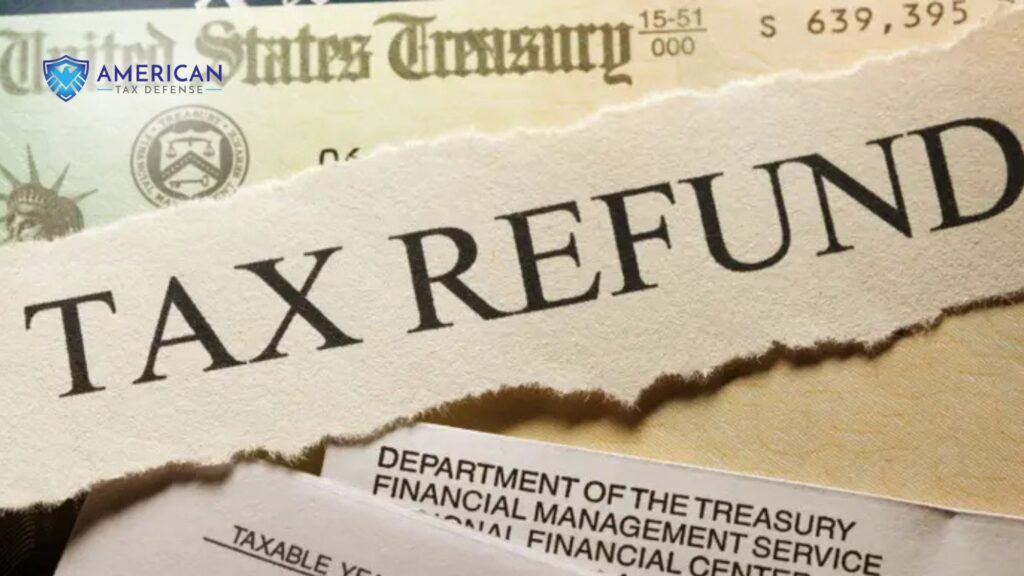If you owe the IRS money, you might be wondering: “Will the IRS take my tax refund?” It’s a common concern for taxpayers facing tax debt, especially during tax season. At American Tax Defense, we know that the tax system can be complex, and understanding the implications of owing taxes can alleviate some of the stress.
In this blog, we’ll explore how the IRS handles tax refunds when you owe money, what you can do to avoid losing your refund, and how American Tax Defense can help you navigate tax debt and resolve issues with the IRS.
Will the IRS Take My Tax Refund If I Owe Money?
The simple answer is: Yes, the IRS can take your tax refund if you owe taxes. This is known as tax refund offset, and it’s part of the IRS’s collections process. The IRS has the authority to use your refund to pay off any outstanding tax debt, penalties, or interest that you owe.
However, this doesn’t mean the IRS will automatically take your refund. Several factors influence whether your refund will be applied to your balance, and understanding these factors can help you plan your next steps.
How Does the IRS Offset Your Refund?
The IRS uses a process called the Treasury Offset Program (TOP) to collect unpaid debts. If you owe federal taxes, the IRS will apply your refund to your outstanding balance. Here’s how it works:
- Outstanding Tax Liability: If you owe money to the IRS, they can offset your refund to cover the amount you owe. This includes back taxes, penalties, and interest.
- Other Debts: The IRS can also use your tax refund to pay other federal or state debts, such as child support, student loans, or other government debts. If you owe federal student loans, for example, your refund may be offset to satisfy that debt.
- Partial Offset: If your tax debt is smaller than your refund, the IRS will only take enough of your refund to cover the balance you owe. You will receive the remaining amount after the offset is applied.
It’s important to note that while the IRS can take your refund to cover your tax debt, this process usually doesn’t affect your state tax refund. However, some states also have their own offset programs, which may seize part of your state refund for state taxes or other debts.
Can I Avoid the IRS Taking My Refund?
While the IRS has the legal right to offset your refund, there are ways to potentially prevent this from happening:
1. Pay Your Tax Debt Before Filing
The most straightforward way to avoid having your refund taken is to pay off your tax debt before you file your return. If you don’t owe money when you file, the IRS has no reason to offset your refund.
- Pay your balance in full: If you can afford to pay your tax debt in full, this will prevent any refund offset.
- Set up a payment plan: If paying the full amount is not possible, you can set up a payment plan with the IRS. By doing so, you may be able to stop the refund offset, especially if you make regular payments.
2. File an Extension
If you need more time to pay your taxes, filing an extension can give you up to six additional months to file your tax return. However, an extension doesn’t mean an extension to pay. Interest and penalties continue to accrue on any unpaid taxes during this period, but it may give you some breathing room to arrange your finances.
3. Claim Innocent Spouse Relief
If you filed jointly with a spouse and your spouse is the one with the tax debt, you might qualify for Innocent Spouse Relief. This provision can protect you from having your refund offset if you can prove that you didn’t know or didn’t benefit from the tax debt.
4. Request an Offer in Compromise
If you owe more than you can afford to pay, you may qualify for an Offer in Compromise (OIC). This is an agreement between you and the IRS where they settle your debt for less than the full amount owed. However, OICs are not easy to qualify for, and you must meet specific criteria. American Tax Defense can help determine if this is a viable option for you.
5. Contact the IRS for Help
If you believe that your refund is being taken due to an error or misunderstanding, it’s crucial to contact the IRS immediately. In some cases, discrepancies in your filing or past taxes can lead to an offset. The IRS will review your case and may adjust your tax liability if there was an error.
What Happens If the IRS Takes My Refund?
If the IRS takes your refund, you will receive a notice explaining the reason for the offset. The IRS will apply your refund to the balance of your tax debt, and you’ll be left with a smaller refund or no refund at all.
Here’s what you can expect if this happens:
- Notice from the IRS: The IRS will send you a Notice of Federal Tax Refund Offset. This notice will inform you of the amount that was taken from your refund, the reason for the offset, and the entity that received the funds (e.g., IRS, Department of Education for student loans, etc.).
- Remaining Refund: If your tax debt is less than your refund, you will receive the difference once the IRS applies the offset.
- Debt Resolution: The offset will reduce your outstanding debt, but you will still be responsible for paying the remaining balance. If you are unable to pay, you can explore options like setting up a payment plan, applying for an Offer in Compromise, or seeking assistance from a tax professional.
How Can American Tax Defense Help?
At American Tax Defense, we specialize in helping taxpayers resolve their tax debt issues with the IRS. If you owe the IRS and are concerned about losing your tax refund, we can guide you through the process of resolving your tax debt and potentially preventing a refund offset.
Our Services Include:
- Tax Debt Resolution: We help you understand your options, whether it’s negotiating an installment agreement, applying for an Offer in Compromise, or addressing any discrepancies.
- IRS Negotiation: We act as intermediaries between you and the IRS, handling all communications to ensure the best outcome.
- Tax Relief Programs: We explore every available avenue to reduce your tax liability, from penalty abatement to relief programs for financially distressed taxpayers.
- Expert Advice: Our team of tax professionals provides tailored advice to help you navigate tax debt issues and avoid costly mistakes.
Conclusion
If you owe the IRS, the question of whether they will take your tax refund is a common concern. The IRS has the authority to offset your refund to pay down your tax debt, but there are ways to mitigate this, including paying off your debt before filing, negotiating with the IRS, and exploring relief programs.
If you’re facing IRS debt and need assistance, American Tax Defense is here to help. We specialize in helping individuals resolve their tax issues, protect their refunds, and avoid IRS enforcement actions. Contact us today to learn how we can assist you in getting back on track and minimizing your tax liability.







